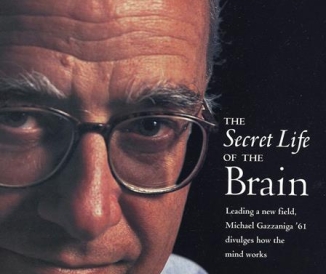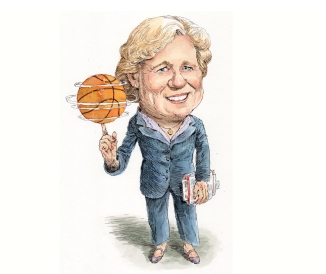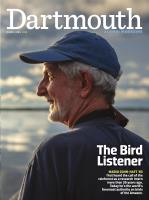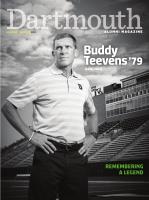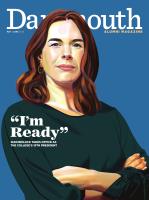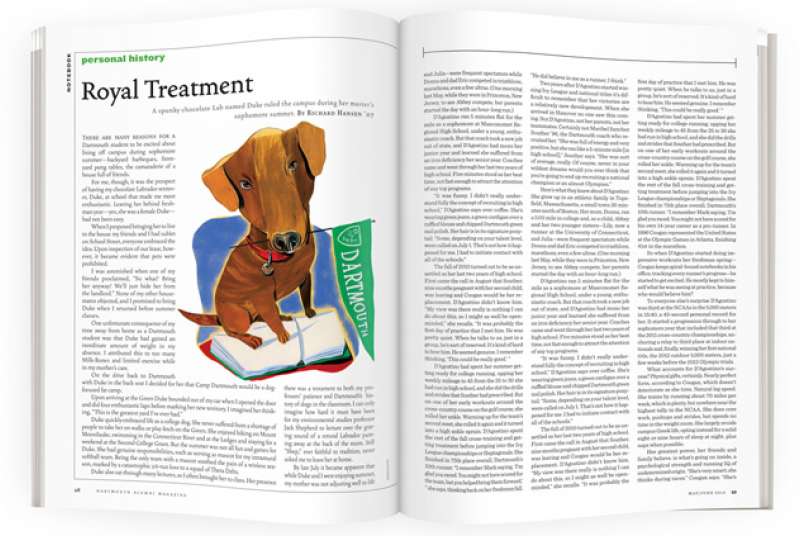
Royal Treatment
There are many reasons for a Dartmouth student to be excited about living off campus during sophomore summer—backyard barbeques, front-yard pong tables, the camaraderie of a house full of friends.
For me, though, it was the prospect of having my chocolate Labrador retriever, Duke, at school that made me most enthusiastic. Leaving her behind freshman year—yes, she was a female Duke—had not been easy.
When I proposed bringing her to live in the house my friends and I had sublet on School Street, everyone embraced the idea. Upon inspection of our lease, however, it became evident that pets were prohibited.
I was astonished when one of my friends proclaimed, “So what? Bring her anyway! We’ll just hide her from the landlord.” None of my other housemates objected, and I promised to bring Duke when I returned before summer classes.
One unfortunate consequence of my time away from home as a Dartmouth student was that Duke had gained an inordinate amount of weight in my absence. I attributed this to too many Milk-Bones and limited exercise while in my mother’s care.
On the drive back to Dartmouth with Duke in the back seat I decided for her that Camp Dartmouth would be a dog-focused fat camp.
Upon arriving at the Green Duke bounded out of my car when I opened the door and did four enthusiastic laps before marking her new territory. I imagined her thinking, “This is the greatest yard I’ve ever had.”
Duke quickly embraced life as a college dog. She never suffered from a shortage of people to take her on walks or play fetch on the Green. She enjoyed hiking on Mount Moosilauke, swimming in the Connecticut River and at the Ledges and staying for a weekend at the Second College Grant. But the summer was not all fun and games for Duke. She had genuine responsibilities, such as serving as mascot for my intramural softball team. Being the only team with a mascot soothed the pain of a winless season, marked by a catastrophic 26-run loss to a squad of Theta Delts.
Duke also sat through many lectures, as I often brought her to class. Her presence there was a testament to both my professors’ patience and Dartmouth’s history of dogs in the classroom. I can only imagine how hard it must have been for my environmental studies professor Jack Shepherd to lecture over the grating sound of a rotund Labrador panting away at the back of the room. Still “Shep,” ever faithful to tradition, never asked me to leave her at home.
By late July it became apparent that while Duke and I were enjoying summer, my mother was not adjusting well to life without a dog. Over the phone she described in a distraught voice how strange it felt to not have “her dog” around, constantly begging for treats. Having discovered the College Web cams while visiting the Dartmouth Web site, she asked me for a favor. She wanted to arrange a time when Duke and I would go to the Green so she could see us live.
I agreed to honor the request at 10 a.m. the next day. While Duke and I stood in the middle of the Green facing the Hanover Inn I called my mother to notify her we were in position. “Oooh, I can see you!” she shouted when she answered. I laughed and waved awkwardly. Afterward, I muttered to Duke, “Girl, I’ve heard of empty-nest syndrome, but empty-kennel syndrome? This is crazy.”
Back on School Street we had only one close call with the landlord, when he stopped by unannounced one morning just as I was waking up. Still barefoot and shirtless, I scrambled to sneak Duke out of the house. I consider us lucky he never questioned the odor of wet dog that permeated the house.
As the summer concluded I decided to evaluate the success of Doggy Fat Camp. A trip to the veterinary clinic revealed Duke had shed 14 pounds since coming to Dartmouth!
I took Duke for a walk around campus on our last night in Hanover and reflected on the events of the past few days. As many people had stopped by my house to say goodbye to Duke as had come to see me. The next day Duke saw Dartmouth for the last time as we headed westward across the Ledyard Bridge.
Duke never returned to Hanover, but I always made sure she wore a Dartmouth collar. Last fall Duke’s vet discovered she had a fatal liver tumor. On the day Duke was put to sleep I cradled her tired head in my arms as she lay on the cold, metal examination table. I focused on her jaundiced eyes as the vet injected her with the medicine that stopped her heart and ended her pain. My mother and I wept as Duke closed her eyes and took a final breath.
That night I sent e-mails to my friends who lived with Duke and me sophomore summer. I smiled when I read one friend’s response: “Sorry to hear about Duke. She was a good dog and her nine years probably contained more minutes of pure happiness than most humans experience in 80-plus years.”
I spoke with another Dartmouth friend, Greg Sheehan ’07, who had been a self-avowed dog-hater before meeting Duke and becoming her great friend. It was not uncommon to find the two of them playing fetch in the yard. When I told Greg about Duke’s death he confided in me that he had just been thinking about her and was considering getting his own Labrador retriever.
Although I buried Duke’s ashes at my cabin in northern Minnesota, it would have been equally fitting to spread them over the Connecticut River. She was, after all, Dartmouth’s Duke.
Richard Hansen lives in Minnesota.



